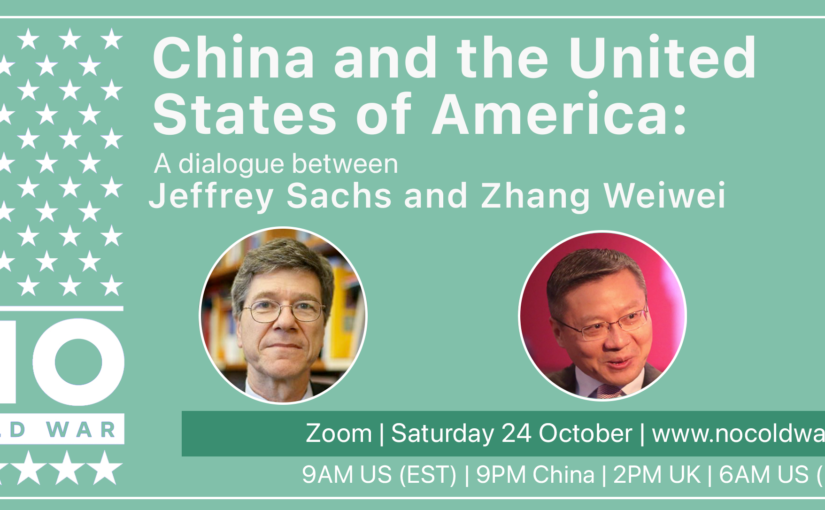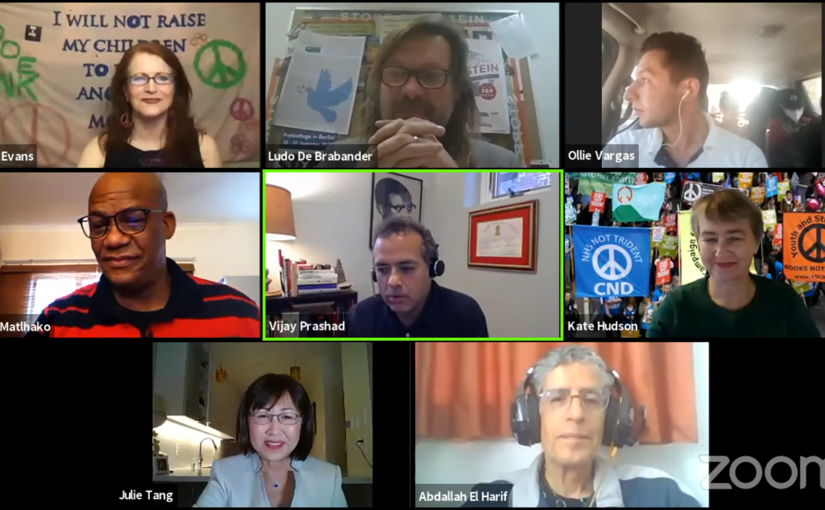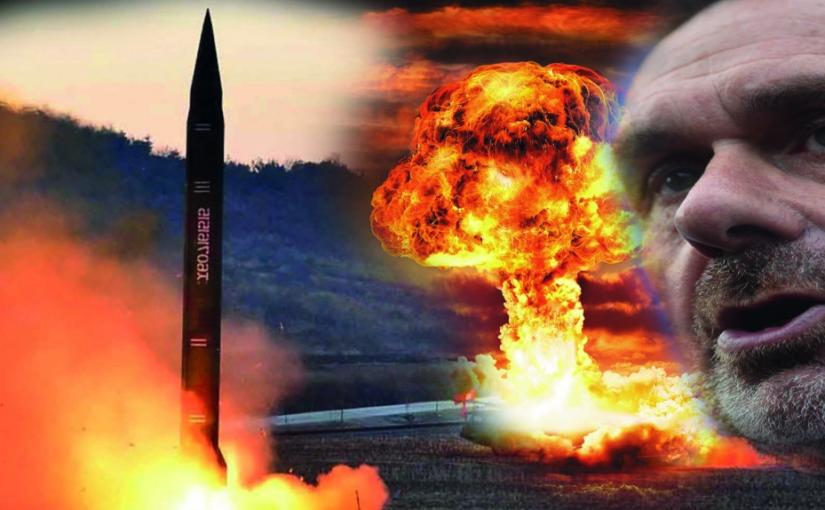On 24 October, No Cold War hosted a dialogue between Zhang Weiwei (professor of international relations at Fudan University, former interpreter to Deng Xiaoping, and author of several books including the best-selling The China Wave: Rise of a Civilizational State) and Jeffrey Sachs (a leading expert in sustainable development, former director of The Earth Institute at Columbia University, and author of several books including the influential The End of Poverty). The online event was attended by over 400 people, with registrations from 62 countries.
Chairing the event, Jenny Clegg (academic, activist, and the author of several books including China’s Global Strategy: Towards a Multipolar World) outlined the rationale for organising the dialogue. When the countries of the world should be coming together to find common solutions to common problems – the climate crisis, the pandemic, a fragile global economy – we find ourselves at the cusp of a New Cold War.
With the rise of China and the decline of the US, there’s more and more talk of the Thucydides Trap, in which the rising power is destined to come into conflict with the prevailing power. Clegg stated that a massive effort and bold vision will be needed if the world is to avoid a catastrophic confrontation. This is the reason for bringing high-level figures from the US and China together: to expand and deepen communication, and to start to forge a path towards a future of peace, multipolarity, cooperation, and global prosperity.
Zhang Weiwei calls for global cooperation in the interests of humanity
In his introductory remarks, Professor Zhang offered a broad outline of China’s vision for a multipolar world order, pointing out that China has no desire to be a hegemonic power or to impose its will on other countries. He stated that China wishes to see a democratic and peaceful system of international relations from which everybody can benefit, consistent with the ancient Chinese concept of harmony in diversity. Unfortunately US political culture seems to be stuck in the idea of the zero-sum game, and can only imagine China’s rise being at the expense of the US.
Zhang asserted that China has no interest in exporting its ideology or its values, although it is certainly happy to offer its advice and the fruits of its experience. For example, the US is desperately in need of political and economic reform. China has some expertise in reform, since the Chinese engage in continuous pragmatic reform in order to further their development and improve living standards. Meanwhile, a large number of developing countries increasingly look to China for inspiration, having tried unsuccessfully to follow a Western development model.
China firmly opposes war, both hot and cold, and it believes all disputes can and should be solved through negotiations, dialogue and compromise. It believes in multilateralism and a global approach to peace. For example, ever since China became a nuclear weapons power in 1964, it has maintained a no-first-use policy, and has pledged never to use nuclear weapons against a non-nuclear state. The world would be a safer place if all nuclear powers would make similar commitments.
Professor Zhang responded to the popular characterisation of China as a ‘one-party dictatorship’ with a deteriorating human rights situation. He pointed to the results of multiple surveys, including those conducted by US academic institutions, that indicate an extremely high level of public satisfaction with the Chinese government. Over 90 percent of Chinese people express satisfaction with their central government, compared to around 40 percent for their US counterparts. Meanwhile, approximately 150 million Chinese tourists leave China every year, and 99.999 percent of them come back; this isn’t indicative of a disastrous human rights situation.
Zhang also pointed to the rank hypocrisy of US criticisms of China’s human rights, given that the US itself is responsible for perpetrating by far the worst human rights violation this century: the war on Iraq, in which at least 100,000 civilians died and millions became homeless. Over the course of 2020, the brutal murder of George Floyd and the violent suppression of the Black Lives Matter movement have revealed the depths of ongoing human rights abuses in the US.
Professor Zhang urged the US leadership to stop pursuing the path of war, which would be disastrous for China, for US and for the world. Instead of fighting endless wars and devoting vast resources to the military, it would be far better to direct this investment towards developing the US economy and upgrading its infrastructure. Meanwhile, to handle the challenges it faces of economic rehabilitation, tackling the pandemic and tackling climate change, the US may find that it needs China’s help. Rather than launching a Cold War, it would be better if the US sought China’s help and cooperation. The correct path for the US and China is to reject Mutually Assured Destruction and work instead towards Globally Assured Prosperity, in which the US and China work together with other countries for the common interests of humanity, for peace and development.
Jeffrey Sachs calls for a US foreign policy reset
Professor Sachs opened his contribution by stating that, with Donald Trump in the White House, it is simply not possible for the US to shift towards a rational and multilateral foreign policy. Trump’s trade war has been conducted via executive decree and doesn’t reflect any serious public debate; as such, it doesn’t reflect the will of the US people. His xenophobia, racism and stupidity have very much stood in the way of developing better relations between the US and Chinese people. This is disturbing since, in an increasingly interconnected world, people-to-people exchanges and programmes developing mutual understanding are so important.
Under the Trump government, and with the active support of much of the media, anti-China sentiment has been rising. This reflects a particular strain of American thinking – a Protestant evangelical ideology that views the US as having the providential right to dictate the affairs of the rest of the world.
Sachs observed that the rise of China has made the notion of US hegemony increasingly infeasible, and this has inspired a level of panic in US foreign policy circles. We’re at the end of the period of American domination. The US share of the global economy and technical leadership is declining. We have reached a new era, in which no one country can or should lead. This is an era in which we need cooperation; we need multilateralism. We’re not moving towards a China-led world or a US-led world, but a multilateral rule-based world. Such a system will allow us to work together to effectively fight climate change, poverty and pandemics.
Professor Sachs pointed out that the countries of the world have already agreed to certain basic approaches to the future, particularly around sustainable development. These are embodied in the UN Sustainable Development Goals and the Paris Climate Agreement, both agreed in 2015. The most important thing now is to follow through on these. In this regard, President Xi’s recent commitment that China will reach net zero emissions by 2060 is very important. The European Union has made a commitment to net zero emissions by 2050. Sachs stated his belief that, if Joe Biden wins the presidential election, he will commit the US to net zero emissions by 2050. With these parallel commitments, we will then need extensive cooperation between China, the US and Europe so that the world can meet this challenge.
Sachs said that the idea of ‘decoupling’ – the division of the world into two hostile blocs of nations – is sheer insanity; an invitation to mutual destruction rather than solving the problems we face as a species. Instead, the US and China must figure out how to build more institutional connections, more and more cultural and intellectual exchanges; which is why he appreciates the opportunity to have this dialogue with Zhang Weiwei and to address hundreds of audience members from around the world. With these connections, and with a clearly-defined multilateral system, the world can thrive.
A consensus for multilateralism and peace
Kicking off the discussion section of the event, Zhang Weiwei commented that China is taking ecological matters extremely seriously and that it has changed many policies in the last few years in order to reduce its environmental impact. He said that green technology and sustainable development could be the ideal project to give substance to US-China cooperation.
In answer to a question of whether there were significant forces in the US that were opposed to Cold War, Jeffrey Sachs said that the situation wasn’t beyond hope; that there’s a strong contingent of academic and policy leadership that believes in multilateralism. Many people in the US have fought vociferously against aggression and wars, from Vietnam to Iraq, and will continue to hold up the UN Charter as the key means for preserving peace.
Zhang Weiwei responded that China is a staunch supporter of the UN Charter and the overall framework of international law. Indeed China has been a beneficiary of that system, and believes it can usefully contribute to it going forward. If China and the US can both move in the direction of mutual understanding and cooperation, it would be a tremendous boost for world peace and common prosperity.
In response to a question about whether Cold War could develop into Hot War, the speakers agreed that the situation called for deep institutionalised engagement between the two countries; an agreed approach to disarmament and de-escalation; and sophisticated early warning systems. Professor Zhang pointed out that the US had spent trillions of dollars fighting wars in the 21st century, whereas China has devoted its resources to developing its infrastructure and improving living standards. For the US to reduce the risk of war, it would be well advised to follow China’s example.
A question was raised about whether economic ‘decoupling’ was a serious possibility. Zhang stated that China is firmly opposed to decoupling and won’t be drawn into a system of international relations based on hostile blocs. In reality, most supply chains are too globalised and complicated to be broken up into separate blocs. In terms of technological competition, the US and China have their own strengths and areas of expertise; it would be best if they could cooperate and share. China is promoting a vision of a single global community – a shared future for mankind – and it considers this to be a far better option than decoupling and Cold War.
Sachs noted that the issue of decoupling is most relevant in the digital area: connectivity, computation, artificial intelligence, quantum computing, and so on. There’s proven value to having global standards in this domain. Agreed standards and interoperability have accelerated technological progress and economies of scale. A decoupled digital world with different camps would be a costly mistake. Technological advance can do so much to improve human existence; it would be hugely damaging if it were to be subjected to a Cold War mentality.
In his closing statement, Sachs stated that the most pressing issue right now is to deal with the pandemic. China and other countries have shown that the pandemic can be suppressed. The US, Europe and Latin America need to be willing to learn from this. Sachs outlined an optimistic vision for 2021, in which the world is able to get the pandemic under control and re-focus on sustainable development and poverty alleviation. COP15 on biological diversity, COP26 on climate change, and the World Food Systems Summit are all scheduled for 2021, and each of these will offer an opportunity for the countries of the world to cooperate in a professional and systematic way.
Zhang Weiwei noted that there is currently a bipartisan consensus in the US around being “tough on China”, and the Chinese very much appreciate the fact that Jeffrey Sachs stands outside this framework. Trump and Pompeo are pushing a dangerous and stupid New Cold War. The Chinese leadership is strongly promoting an alternative vision based around peace and cooperation. Zhang urged the US not to let a Cold War mentality become embedded.
Closing the event, Jenny Clegg thanked the panelists, the audience and the organisers, and urged people to visit nocoldwar.org and sign the campaign’s statement, A New Cold War against China is against the interests of humanity.
The full proceedings can be viewed on YouTube.



